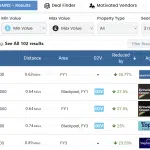|
Getting your Trinity Audio player ready...
|
Whether you are new to the property investment market or have some experience, the amount of terminology and jargon in the world of property investment can be confusing. We’ve put together an A-Z of all things property investment to help bust some of the jargon!
Abandonment
Abandonment occurs when a tenant leaves the property, usually without notifying the landlord or agent before the end of a tenancy. This often happens if a tenant owes rent, but despite them leaving the property, the tenant still has a legal tenancy giving them the right to return if they wish. Taking over a property that has been abandoned is a complex situation and we recommend seeking specialist advice.
Adverse credit
Adverse credit is applied to a borrower that has previous problems with poor credit. This could include regular late payments or bankruptcy.
Arrears
The money unpaid by a tenant after the due date specified in a tenancy agreement.
Assignment
The transfer of ownership of a lease or insurance policy.
Betterment
A tenant can’t be expected to replace old goods with new at their expense by a landlord. This is against the law and allowances must be made for fair wear and tear (see definition below.)
Break clause
A term in a fixed term tenancy which allows either party to terminate the tenancy agreement before the end of term.
Bridging loan
This is a temporary loan to help a buyer purchase a property before they have sold their existing property, it is important to note that bridging loans can become very expensive in an uncertain market.
Buy to let
A property that is purchased with the intent to rent or let the property to generate income. There is opportunity for great yields with a buy to let property. Check out our deal finder and yield hotspots to find out about current buy to let opportunities.
Cashback mortgage
A mortgage where you will receive a percentage or lump sum of your mortgage in cash when you complete your mortgage. This kind of mortgage is very rare.
Capital gains
The increase in value of a property when it is sold for more than its cost, often including its purchase price and stamp duty.
Capital gains tax
Capital gains is taxable and if your property makes capital gains, you will be required to pay capital gains tax.
Contract race
Whilst this is less common, a contract race is when two parties who have made an offer on a property, often of the same value, the vendor will sell to whichever party exchanges contracts first. All parties must be made aware that more than one contract has been issued.
Conveyancing
The process of transferring a property from one party to another, usually through a solicitor or licensed conveyancer.
Deeds
Legal documents detailing who owns a property or piece of land.
Defective lease
A lease that has been poorly drafted. In some cases, the vendor may have to obtain a deed of variation, giving the freeholder permission to change the original terms of the lease. This can be a very lengthy process and may affect other leaseholders.
EPC (energy performance certificate)
A legally required assessment of how energy efficient a residential property is. It is valid for 10 years and required for properties advertised for rent or sale, some exceptions do apply.
Fair wear and tear
This is subjective and depends on a range of factors. It is the amount of damage or deterioration that is reasonably expected in a residential setting. For example, damage to decorations or furniture that would be expected during a tenancy.
Freehold
This is a legal title that gives you absolute ownership of the land your property is situated on.
Gas Safety Certificate
A gas safety certificate is required if you are a landlord letting a property with gas appliances. If your property has any gas appliances you must comply with law relating to gas safety. You must have these appliances checked every year by a Gas Safe registered engineer and the tenants must receive a copy of the certificate before they move in or within 28 days of the checks being carried out.
Gazumping
The process of a seller pulling out a sale after accepting an offer above the asking price. This is often used mistakenly by people who have made an offer below the asking price and lost out to someone who has offered the asking price.
Gearing
Borrowing an amount of money of purchase an investment property.
Gearing ratio
Calculated by dividing the amount of borrowed funds by the value of a property.
Gross rental yield
The annual rent, before expenses, divided by the value of the property. For example, if a property is worth £200,000 and the annual rent is £10,000 your gross rental yield would be 5%.
Ground rent
The fee that a leaseholder pays to a freeholder for use of their land.
HMO
Houses in multiple occupation, often associated with student properties. If you are planning on renting a HMO property it is important to check if you require any additional licenses with the local authorities.
Home buyers report
An intermediate-level survey, usually offered by mortgage lenders and prepared by their own surveyor. The report will comment on the structural condition on readily accessible parts of the property but does not include investigation or testing of water, drainage or heating systems.
IFA
An independent financial advisor.
IDD
An Initial Disclosure Document is designed to assist with the comparison of services provided by lenders and intermediaries as well as fees and charges.
Informal tender
The process of competing buyers submitting their best bids by a set date and time. This is not a legally binding contract, and the vendor can accept a higher offer at any time. Estate agents are legally required to pass on all offers unless instructed to otherwise in writing.
Joint mortgage
A mortgage where there is more than one named individual responsible for the contract.
Joint sole agency
When you employ two estate agents to sell your property, and both receive commission irrespective of which one introduces a buyer. The agents agree to split the fee upon the sale of the property. The agent that sells the property usually gets a higher percentage of the fee. The ratio is pre-agreed with you and written into the agreement.
Joint Tenants
A type of ownership used by couples which ensures that when one dies, the property automatically passed to the other. The alternative to joint tenants is Tenancy in Common.
Joint Venture
A business arrangement where two or more parties work together for new business activity. An arrangement often used in property investment between investors, developers, and construction services.
Leasehold
Given ownership of a property but not the land it is build on. This normally will result in ground rent to a landlord, this is very common for flats and apartments.
Loan to Value
Also known as LTV, the amount of mortgage expressed as a percentage of the property value. For example, a mortgage of £80,000 on a £100,000 property would have a LTV of 80%.
Mortgage Payment Protection Insurance (MPPI)
Insurance designed to pay your mortgage for a short period of time, usually a year, if you are unable to work due to illness, accident or redundancy.
Non-resident landlords
A landlord that lives overseas and is not a UK tax payer. If you are a non-resident landlord you can apply to receive rent without tax being deducted. If this is the case, please see more information on gov.uk.
Overseas landlord
A landlord who is resident overseas for more than six months in a tax year. All overseas landlords must apply for consent for their letting agent to pass on rental income without tax deductions.
Overcapitalisation
The improvement of a property beyond its resale value.
Private sale
The process of selling a property without use of an estate agent.
Rent to rent
This is when a person rents a property and sub-lets to others for a profit. Contractual agreements might not protect all parties involved and rent to rent should only be conducted through professional, accredited agents.
Retention
Holding back part of a mortgage loan until repairs to a property have been satisfactorily completed.
Section 21 notice
This is the notice that must be served in order to end a tenancy.
Share of freehold
Share of freehold means that when you buy a flat the lease on the property comes with a share of ownership of the building. Leaseholders in a block with several properties often choose to buy the freehold between them and so share of freehold gives them more control over the management of the property. It is important to remember that when purchasing a property with a share of free hold, the property is still a leasehold property.
Sole agency
The process of employing the services of one agent to sell your property for an agreed period. Should you sell your property through another agent before your agreement with the sole agent has ended, then you may have to pay the original agent their fee as well. Likewise, the agent must respect the terms of the agreement and ensure that the service promised and agreed is delivered. If other agents approach you during the term of a sole agency agreement, they must warn you of a possible liability to pay commission to more than one agent. Sole Agency fees are lower than where more than one agent is instructed.
Stamp Duty Land Tax
A duty levied on certain transactions, including property purchase. Some exemptions to stamp duty do apply.
Tender
This is an arrangement where prospective purchasers are invited to submit sealed bids by a previously stated date and time. The moment the offer is accepted by the seller, the arrangement becomes a legally binding contract.
Transfer of equity
Adding or removing a party to a mortgage.
Vendor
The seller of a property or piece of land.
Yield
The yield of property tells you the annual return on your investment. To find out more about rental yield, explore our tools or head to our blog page.













